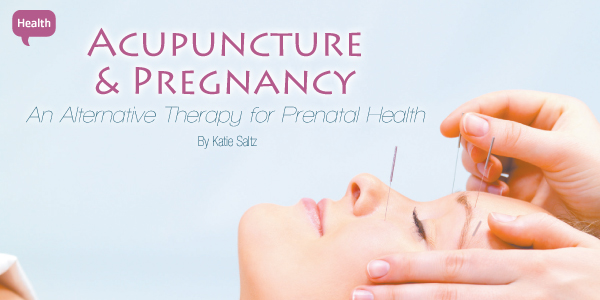Acupuncture & Pregnancy An Alternative Therapy for Prenatal Health
By Katie Saltz
From fertility issues to decreasing morning sickness, acupuncture may be the key to many pregnancy woes.
Acupuncture is a 3,000-year-old holistic form of medicine where solid stainless steel needles are inserted into certain areas of the body to address various physical conditions.
Jacqui Kinzig, L.Ac., Dipl.Ac. (NCCAOM), said because acupuncture uses the body’s own healing system it is considered safe during pregnancy.
Sessions involve a lot of communication and assessment before the needles are even placed.
“During a treatment, the practitioner will do a thorough intake before checking the mom’s tongue and pulse to help gauge what imbalances are present in her body,” Kinzig said.
“The needles are then inserted and the patient lies comfortably for 15-30 minutes.”
Needles are a common fear, but Kinzig said the process is not painful like many people might think.
“Most people do not feel the needles go in and describe acupuncture as very relaxing,” she said. “In fact, many people find that they actually fall asleep during a treatment.”
Treatable conditions related to pregnancy include fertility issues and decreasing the change of miscarriage, Kinzig said.
“Acupuncture helps bring balance to the endocrine system, regulate menstrual cycles, increase circulation to the reproductive tract, and improve sperm quality in men,” she said.
“Recent studies show that regular acupuncture can boost IVF and IUI success rates by up to 60%.”
For patients who are currently pregnant, morning sickness, constipation and various body pains are all addressed by acupuncture, Kinzig said. She also reports it can help turn a breech baby, induce labor, and increase milk production and energy levels postpartum.
Caitlin Clark of Georgetown began acupuncture treatment before her first pregnancy to treat back pain. She also suffered from severe migraines, which were treated with Botox injections.
When she became pregnant, the Botox was no longer a safe option so she discovered how acupuncture could help her headaches instead.
Clark goes weekly for her treatments for relief from the back pain, headaches, and even for helping with anemia. Any first-time jitters were quickly calmed.
“I was anxious the first time,” she said. “After the first experience I had no idea why I was so nervous in the first place.”
The most common side effect of acupuncture is bruising, due to increased blood volume in pregnancy.
Kinzig said eating prior to treatment is also important since it can lower blood sugar.
“Certain points on the body should be avoided during pregnancy, including points on the low back and abdomen,” Kinzig said. “A well-trained professional will be aware of all contraindications and will keep the mom and baby’s safety in mind at all times.”
Many medications or therapies can affect an unborn baby, which is why Clark was happy to learn that acupuncture is available to pregnant women.
“When you are pregnant, you have options and this is a great one,” she said. “You don’t have to worry about putting your baby in danger. That’s what every mom wants.”
Jacqui Kinzig has a Master’s degree in Acupuncture and is Board Certified by NCCAOM.

